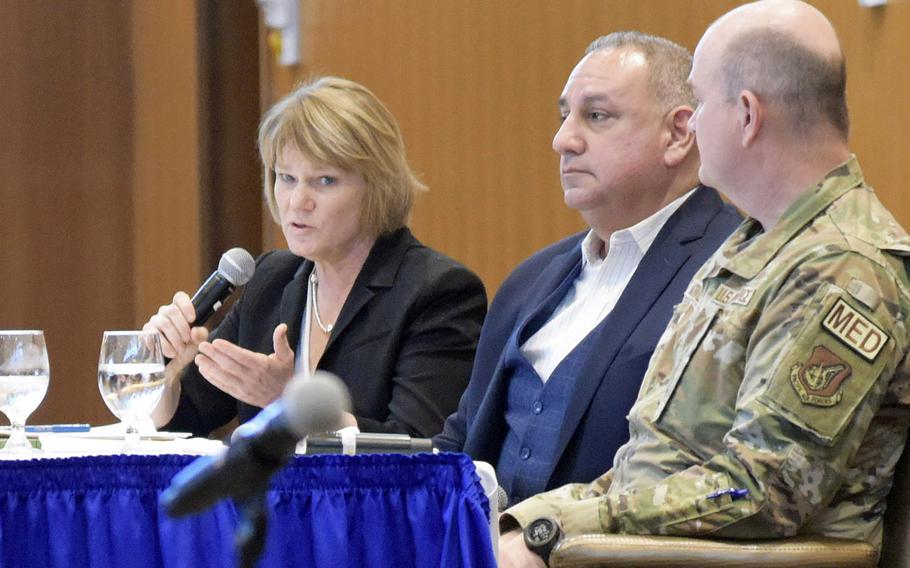
Seileen Mullen, left, acting assistant secretary of defense for health affairs; Gilbert Cisneros Jr., center, undersecretary of defense for personnel and readiness; and Col. John McFarlane, 18th Medical Group commander, answer questions about civilians’ access to medical care at Kadena Air Force Base, Okinawa, Feb. 1, 2023. (Frank Andrews/Stars and Stripes)
TOKYO — Defense Department civilians with chronic health conditions like asthma and diabetes can be treated once again — though on a space-available basis — by on-base doctors in the Indo-Pacific region.
The change was directed by the Defense Health Agency in a Friday memo to Army Maj. Gen. Joseph Heck, the region’s director. It was signed by Dr. Brian Lein, DHA’s assistant director of health care administration.
On Jan. 1, Heck began enforcing a policy that ended easy access to U.S. military hospitals in the region for anyone not covered by Tricare Prime, the military’s top-tier health care plan. Only space-available appointments for acute medical problems were available to many DOD civilians and veterans without Prime.
Friday’s memo directed Heck to reverse that decision and spelled out the military hospitals’ mission: “to provide health care to Tricare beneficiaries, maintain the medical readiness of the force and contribute to installation support activities.
“Because the civilian component of our total force (civilian employees and contractor personnel)is critical to our mission success, medical treatment facilities overseas will provide medical care on a space-available basis to both them and their authorized accompanying family members,” the memo said.
Military treatment facilities, or MTFs, must implement “standard processes” to enhance access to care, according to the memo.
“Standard processes include optimizing appointment capacity to enable safe care and treatment for the greatest number of patients within the capability of the MTF,” the memo said. “MTFs are expected to meet access to care standards for active duty service members and active duty family members and make excess appointment capacity available for space-available care in accordance with DOD policy.”
Space-available care will be provided within the MTFs scope of services, according to the memo.
“Lastly, we continue to evaluate additional health care solutions for members of our civilian component who are not Tricare beneficiaries,” the memo said. “MTFs will continue to provide information about host nation healthcare resources.”
The change comes just weeks after thousands of DOD civilians in Japan turned out at a series of town hall meetings to let Pentagon hear their dissatisfaction.
Over four days, DOD officials fielded mostly the same questions at six U.S. bases in Japan. They also heard a catalog of personal anecdotes about the consequences of requiring DOD employees and their families to seek medical care from Japanese providers.